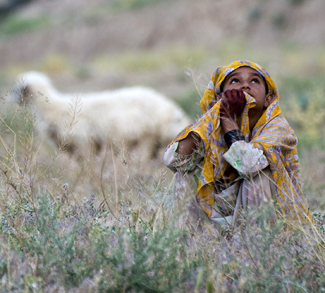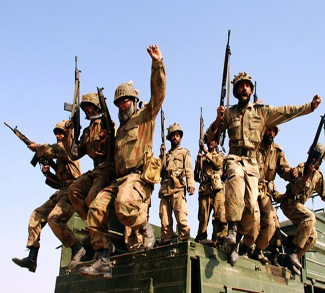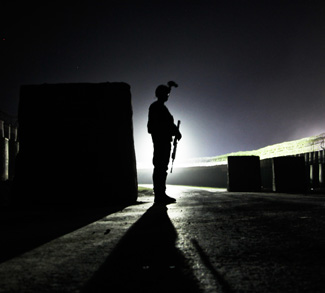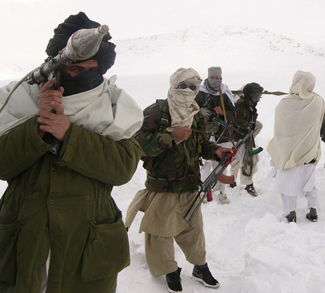FORECAST
American diplomats have confirmed long-swirling rumors that Washington will be supporting Afghan government efforts to integrate the Taliban into the political mainstream. But, will the Taliban bite?
According to Secretary Clinton, the new political surge in Afghanistan will include, “supporting Afghan-led efforts to reintegrate Taliban who renounce Al Qaeda, cease violence, and accept the constitutional system.” Judging by these remarks, it seems that policy planners in Washington have concluded that post-NATO Afghanistan’s long-term stability is contingent on the Taliban’s inclusion in the Afghan political process.
Just how this reconciliation will be accomplished remains murky ahead of this week’s conference in London, but there are a few indications as to how the process will work.
There will be a substantial material component, as President Karzai has proposed a $1 billion amnesty fund meant to provide jobs, education, and protection to any fighters that lay down their arms and turn themselves in. On top of these incentives, the Afghan government will also be extending assurances that anyone who gives up the fight will not be subject to arrest or harassment.
Both the Americans and the Afghan government are of the mindset that this program will appeal to the lower-middle strata of the Taliban movement; fighters who are more angered by the presence of foreign troops in Afghanistan and President Karzai’s economic mismanagement than committed to Taliban ideology.
Unfortunately, the diplomatic track is being tabled a little too late to be a true game changer. There are several factors indicating that rehabilitation is destined to fail and Taliban alienation and animosity will continue well beyond the departure of NATO troops.
First and foremost are the contradictions between Taliban ideology and Afghanistan’s constitutional democracy. While there is still debate over the degree to which the Taliban has transformed from a strictly Pashtun ethnic movement to become defined by Islamist ideology, constitutional democracy presents dissonance in the form of: women’s rights, secularism, and the system’s foreign origins.
The second factor is another point of ideological contradiction- the Taliban’s expected renunciation of Al Qaeda. To ensure that the process of rehabilitation is at least slightly palatable to Western political audiences, officials in Washington are emphasizing that cutting a deal with the Taliban does not mean cozying up to Al Qaeda. The problem is that, despite a history of friction between the two movements, the Taliban refused to renounce Al Qaeda in the immediate wake of 9/11 as well as during the subsequent invasion of Afghanistan. That top Taliban leadership would decide to do so now that the clock is quite obviously ticking on the NATO deployment in Afghanistan is wishful thinking.
Finally, the ‘surge then negotiate’ strategy requires a NATO position of power that has not yet materialized. The Taliban’s current military and financial position, dug in around the country and able to pay its’ fighters higher salaries than the Afghan government, is strong enough to outlast the NATO deployment. After NATO troops are pulled out, the Taliban can try to seize Kabul and rule without having to worry about sharing power with any other ethnic or political power base in Afghanistan.
The NATO push for political rehabilitation in Afghanistan is a step in the right direction, but it has come too late in the game to have a major, long-lasting impact.
SUMMARY OF EVENTS: January 18th – January 25th 2010
NORTH AMERICA
United States
Royal Dutch Shell’s controversial plans to drill for billions of barrels of oil in the Arctic’s environmentally sensitive frozen waters face a potentially damaging legal challenge.
A divided court strikes down decades-old restrictions on corporate campaign spending, 5-4, reversing two of its precedents and freeing companies to advertise
President Barack Obama on Thursday is expected to propose new limits on the size and risk taken by the country’s biggest banks, marking the administration’s latest assault on Wall Street in what could mark a return, at least in spirit, to some of the curbs on finance put in place during the Great Depression, according to congressional sources and administration officials.
CENTRAL AMERICA & CARIBBEAN
Haiti
The confirmed death toll from Haiti’s devastating earthquake has risen above 150,000 in the Port-au-Prince area alone, a government minister has said.
Thousands of Haitians are continuing to flee the capital, Port-au-Prince, fearful of aftershocks and concerned at the bleak prospects for work and normal life following the deadly earthquake of January 12.
Haitians sought comfort in their faith Sunday, flocking to pray in church ruins as rescue teams raced against time to pull out any final survivors five days after a devastating earthquake.
WESTERN EUROPE
United Kingdom
Britain’s opposition Conservatives attacked the government’s record on defense spending on Tuesday as the fall-out from an inquiry into the Iraq War threatened to damage the ruling Labor Party.
MIDDLE EAST
Iran
President Mahmoud Ahmadinejad hinted on Sunday that Tehran would itself pursue uranium enrichment to higher levels if the West spurns its offer of a phased fuel swap, promising Iranians “sweet” news soon.
A key meeting aimed at tackling Iran’s suspected nuclear arms programme has ended in failure after a low-level Chinese delegate blocked a new round of UN sanctions against the Islamic republic.
Yemen
As Yemen ratchets up a military offensive against al Qaeda, Saudi Arabia is quietly pressing a surprisingly costly battle of its own against rebels along Yemen’s northern border.
SOUTH ASIA
Afghanistan
Afghanistan is to postpone its parliamentary elections by four months until September, the country’s election commission has confirmed.
The United States on Friday announced plans to re-integrate Taliban insurgents back into the mainstream, with the process envisaged to achieve success by July 2011, a timeframe matching US plans to withdraw troops from Afghanistan.
Afghans paid $2.5bn (£1.5bn) in bribes over the past 12 months, or the equivalent of almost one quarter of legitimate GDP, a UN report suggests.
Pakistan
Iran and Pakistan finalized an agreement to build the IPI pipeline which is due to take Iran’s rich gas reserves to his energy hungry nation, a Pakistani official announced.
Securing and stabilising the Pakistan Taliban stronghold of South Waziristan in the northwest tribal belt will take between six months and a year, the chief military spokesman said Thursday.
Taliban militants killed seven tribesmen in the North Waziristan tribal region on the Afghan border who they suspected of spying for the United States, security officials said on Sunday.
India
The future of automotive industry lies in the BRIC Countries, as these emerging markets will account for 30 per cent of world auto sales in 2014, besides providing opportunities for research and development, sourcing and manufacturing, says a study.
EAST ASIA
China
China has denounced US criticism of its internet controls, saying it could harm ties between the two countries.
A mistake by a US Navy intelligence official has given the world an unexpected peek into the secret world of China’s navy. The US Office for Naval Intelligence (ONI) committed the blunder of posting, on an open website, the agency’s assessment of the state of the PLA Navy. Before the ONI could rectify this indiscretion by pulling off the report, it had been downloaded and posted on a publicly accessible website.
The US has called on Beijing to investigate the recent cyber attacks on Google, which have prompted the search giant to threaten to leave China.
Japan
A leading figure in Japan’s governing party, Ichiro Ozawa, says he will not resign despite a growing scandal over political funding.
North Korea
North Korea proposed Friday holding military talks with South Korea next week to discuss ways to facilitate their joint industrial park in the North, an official said.
AFRICA
Nigeria
Clashes between Muslim and Christian gangs have broken out again in the capital of central Nigeria’s Plateau state, Jos, causing dozens of deaths and forcing police to impose a 24-hour curfew.




